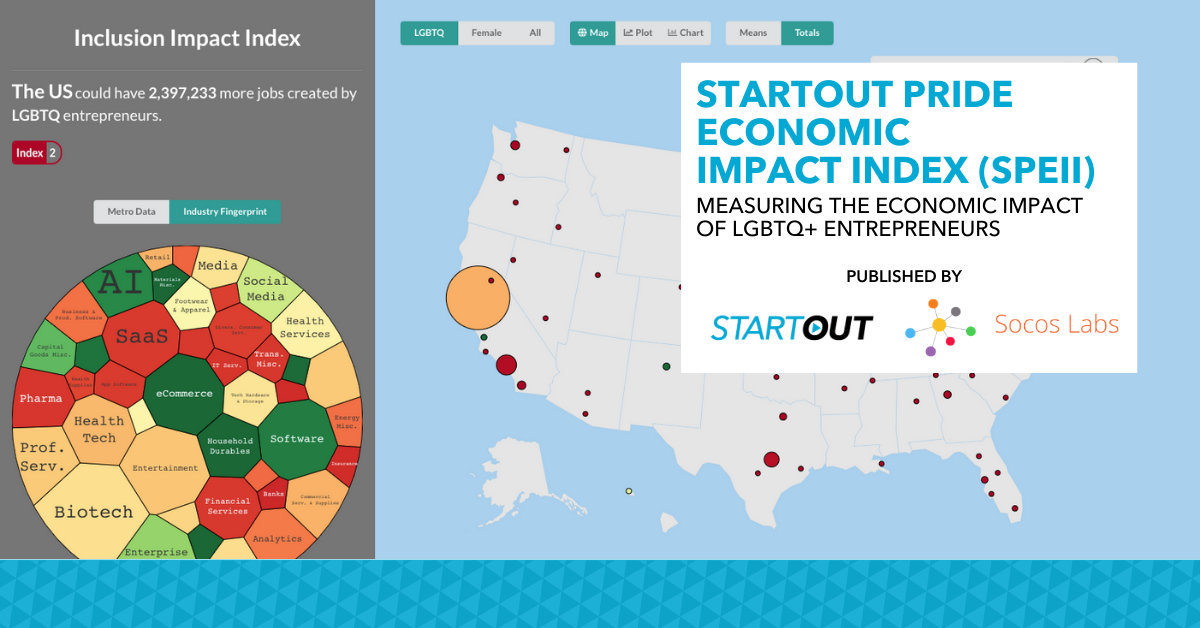
Chris Young, StartOut’s Board Chair, discusses the launch of the StartOut Pride Economic Impact Index (SPEII), two years in the making with Socos Labs.
About 5 months ago — before COVID-19 upended everything — I wrote a blog post about the StartOut Pride Economic Impact Index, commonly referred to as the SPEII. Today we are officially taking it out of beta mode and launching this living, breathing platform to help drive economic growth and empowerment!
The index, generously supported by JPMorgan Chase, has been in both development and in public beta for well over a year in a partnership between StartOut and Socos Labs. We have also had wonderful contributions from Ogvily, Google, Crunchbase, ROMBA, and MAP who support us in-kind.
For those who don’t know about it, the SPEII is a groundbreaking and first of its kind application that analyzes millions of data points to identify the contributions and economic impact of high growth LGBTQ+ entrepreneurs on the larger economy as well as their unrealized potential.
It does this by measuring the economic impact of the high growth LGBTQ+ startup community on individual cities and regions as well as quantifying the impact of job and innovation loss when LGBTQ+ founders do not have equal access to capital.
The idea behind SPEII is to address a fundamental lack of visibility when it comes to LGBTQ+ representation within the larger economy. It is expected that over the next decade small and medium-sized businesses (largely powered by entrepreneurs) will drive more than half of the job growth realized in this country. Having a clear sense of LGBTQ+ impact as a subset of that entrepreneurial community is vital, not only to understanding what jobs are being created, but also to understanding what jobs are being left on the table.
For now, SPEII will focus only on high-growth entrepreneurs. In laymen terms that means entrepreneurs who were either founders (or co-founders) or employees prior to either their company receiving Venture Capital funding, or at least $1M in Angel funding. Also, if their company generated at least one patent, created jobs beyond the founding team or had a liquidity event such as an IPO or were acquired they satisfy the criteria needed to be considered a high growth entrepreneur.
It’s a mouthful! But these high-growth companies are contributing the majority of net impact, hence the restriction.
It’s going to be a long and bumpy road with setbacks and leaps forward but the hope is that as the Index matures we’ll be able to see where LGBTQ+ communities have found a level playing field and contrast that to areas where they haven’t. In that sense it will be a powerful tool to help measure the impact of inequality upon the larger economy by benchmarking relative performance among regions, cities and underserved communities.
We’ll gain insight into contributing factors behind those impacts, uncover migration patterns and begin to understand underlying motivations. All of this will allow us to lay the groundwork — based on real time data — for a more just economic playing field as well as help inform new economic and social policies.
I can’t underscore enough that the SPEI Index is a real time platform and continuing to gather more and more data is crucial. You can help reduce the data gap of LGBTQ+ companies in under-represented cities by identifying “out” companies and entrepreneurs nationwide.
In the meantime, I’ve also included some links to recent press about the initiative and please help by participating all you can! It’s data that drives policy and the SPEII represents a much needed and substantive step forward to becoming a force multiplier for the community and bringing about real change, economic empowerment and a leveling of the playing field for minority entrepreneurs.